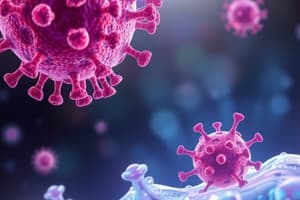Podcast
Questions and Answers
Which statement accurately describes an antigen?
Which statement accurately describes an antigen?
- An antigen is any foreign molecule that can trigger an immune response. (correct)
- An antigen is a pathogen that always causes disease.
- An antigen is a type of immune cell that produces antibodies.
- An antigen is a vaccine that provides active immunity.
What is the primary function of B cells in the immune response?
What is the primary function of B cells in the immune response?
- To directly ingest and destroy pathogens.
- To transport immune cells to the site of infection.
- To produce antibodies that neutralize pathogens. (correct)
- To activate other immune cells with cytokines.
What does clonal selection refer to in the immune response?
What does clonal selection refer to in the immune response?
- The transfer of antibodies from one individual to another.
- The method by which pathogens evade immune detection.
- The process of eliminating all immune cells after an infection.
- The production of identical immune cells targeting specific pathogens. (correct)
Which of the following correctly describes passive immunity?
Which of the following correctly describes passive immunity?
Which of the following is an example of a zoonotic disease?
Which of the following is an example of a zoonotic disease?
Which of the following correctly describes Helper T Cells?
Which of the following correctly describes Helper T Cells?
Passive immunity involves the body's own production of antibodies after exposure to an antigen.
Passive immunity involves the body's own production of antibodies after exposure to an antigen.
Define zoonosis.
Define zoonosis.
The immune system is activated by foreign molecules known as __________.
The immune system is activated by foreign molecules known as __________.
Match the following diseases with their classification:
Match the following diseases with their classification:
Flashcards
Antigen
Antigen
Any foreign molecule that can trigger an immune response. Examples include pollen, bacteria, and viruses.
Clonal Selection
Clonal Selection
The process in which the immune system identifies specific pathogens and produces B and T cells to fight them.
Immunity
Immunity
The body's ability to resist or fight off infections, diseases, or harmful substances.
Passive Immunity
Passive Immunity
Signup and view all the flashcards
Active Immunity
Active Immunity
Signup and view all the flashcards
What is clonal selection?
What is clonal selection?
Signup and view all the flashcards
What's an antigen?
What's an antigen?
Signup and view all the flashcards
What is passive immunity?
What is passive immunity?
Signup and view all the flashcards
What is immunity?
What is immunity?
Signup and view all the flashcards
What is active immunity?
What is active immunity?
Signup and view all the flashcards
Study Notes
Antigens
- Antigens are foreign molecules that trigger an immune response.
- Examples include pollen, bacteria, viruses.
- Antigens are located on the surface of pathogens.
Immune Response (Challenge and Response)
- Challenge: Antigens on pathogens invading the body.
- Response: Ingestion of the pathogen by a macrophage.
Helper T Cells vs. B Cells
- Helper T Cells: Activate immune cells using cytokines.
- B Cells: Produce antibodies.
Clonal Selection
- Clonal selection is the body's process of producing B and T cells to target specific pathogens.
- These cells identify and respond to specific pathogens.
Immunity
- Immunity is the body's ability to fight off infections and harmful substances.
- Recognizing and neutralizing pathogens or toxins is part of immunity.
- Passive Immunity: Transfer of antibodies.
- Active Immunity: Production of antibodies after exposure to antigens (e.g., vaccines or infection).
Zoonosis
- Zoonosis is the transmission of diseases from animals to humans, caused by pathogens (bacteria, viruses, or parasites).
- Examples include COVID-19, bird flu.
Zoonotic vs. Non-Zoonotic Diseases
- Zoonotic: Rabies, Ebola
- Non-Zoonotic: Diabetes, Cancer
Allergic Symptoms
- Allergic symptoms can be caused by histamines.
Smallpox
- Smallpox is a disease.
Studying That Suits You
Use AI to generate personalized quizzes and flashcards to suit your learning preferences.




